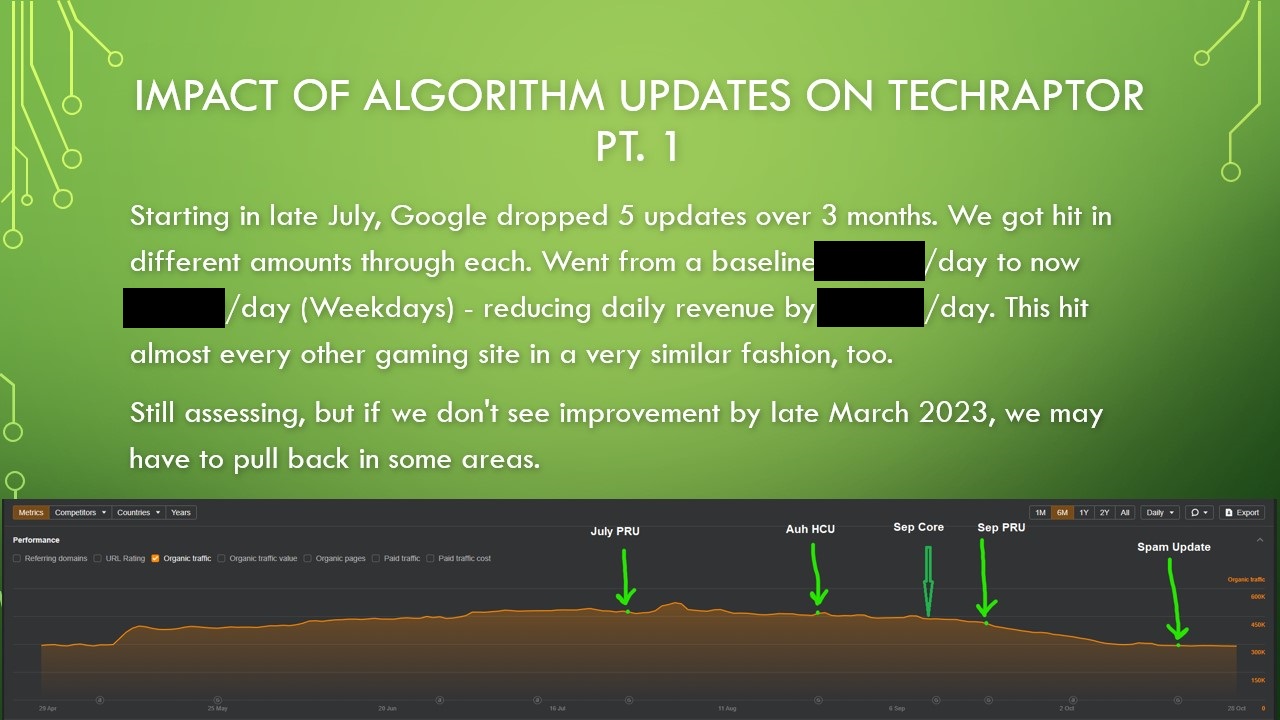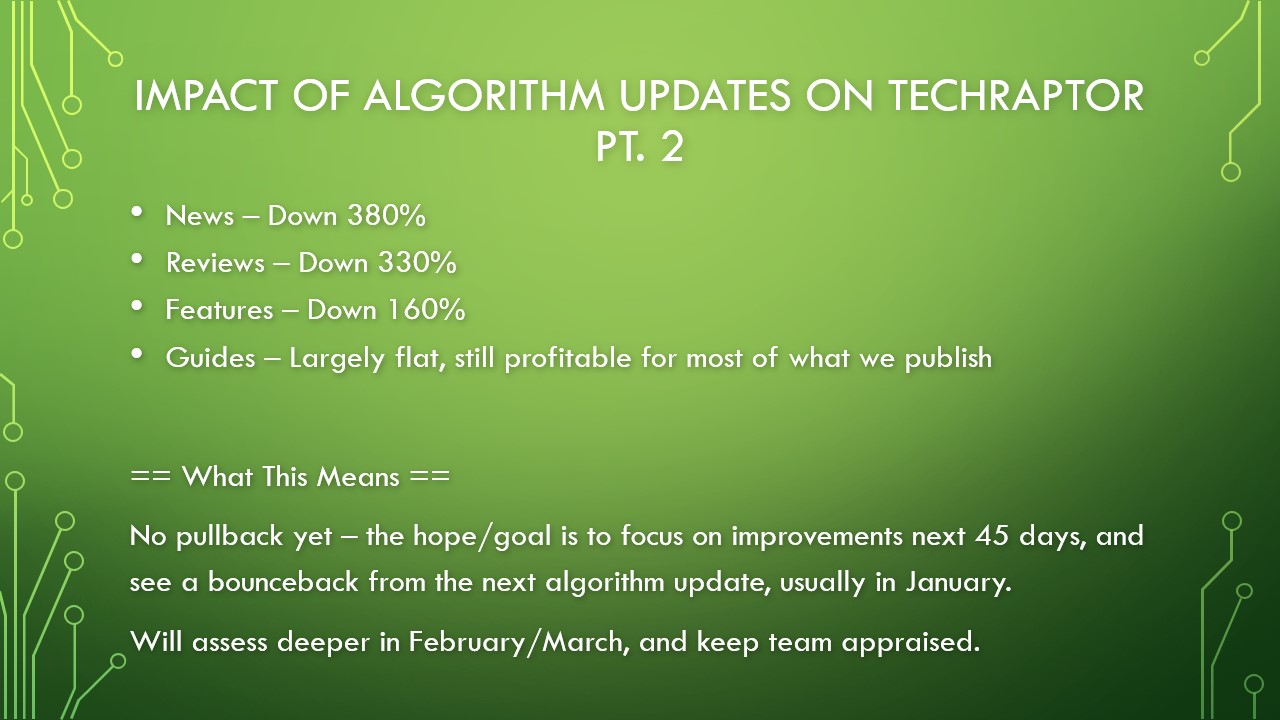Layoffs are not something that anyone should want. Starting 2023 with sweeping layoffs at major tech companies and media outlets is a depressing and emotional scene. It’s not fair to the workers, and it underlines a core issue within capitalist society – a complete lack of empathy.
Layoffs are not a surprise to the owners and executives of businesses unless they’re completely blind to the performance of the company.
Groundwork – Forecasting Is Critical To Business
To be an effective company, forecasting is a critical component of the financial management of a company. If you’re doing it right, you’ll have a good picture of where your company will be sitting for the next 3, 6, 12 months and beyond.
In that forecasting, you will track revenue vs. expenses, and weigh the impact of adding (or removing) employees.
If you’re doing it right, you’ll also account for upturns and downturns in your industry, seasonality, and more to understand the limit and timing of when you can no longer sustain a certain staffing level.
Which is why, despite layoffs almost always being a surprise to employees, they are NEVER a surprise to the people who employ them. It is absolute bullshit if companies act surprised.
They knew. They always know.
Transparency Means Security & Accountability
If you’re reading this, maybe you know me, or maybe you don’t. Either way, let me (re)explain my philosophy around my business.
- I don’t hold anything close to my chest.
- I don’t believe I know everything, and I want input.
- I OWE my team transparency.
- My team is my #1 priority.
Granted, I don’t give the keys to the bank account, but our financials are available to anyone who asks. I regularly share where our bank account sits, and how much runway we have if we went to $0 in revenue, something that would be near-impossible.
It’s served me well, and I’ve been blessed to not have to announce an actual pullback in rates, pay, or anything else in 5 years since we became profitable.
To me, it’s common sense. I give my people a sense of security and understanding of where things sit, and they also have an opportunity to hold ME accountable if I miscalculate.
Of course, when things are tough – I have to communicate the possibility of a pullback, but NOT layoffs. Because, as I laid about above – I forecasted and I know how much time I have to turn things around.
TechRaptor has no standing meetings for staff, and I communicate major changes (policy, tech, people) in detail via e-mail and Slack. However, I do call larger meetings in the event of something major, and we also have an annual meeting in December to discuss the business, where it stands, and our big wins from the year, and then I open to floor to any/all questions.
2020 and 2021 were overly positive annual get-togethers, 2022 was also positive, but I also had to underscore that success with the POTENTIAL for a pullback.
Leading By Example – How I Communicate Potential Layoffs/Pullbacks
Since I believe in the transparency I preach, here’s what some of that looked like.



I like to think this level of transparency helped my team feel more secure in where things stood, and luckily, we started seeing recovery shortly after this meeting. I’m still being cautious, and tracking forecasts closely.
That said, if we hadn’t seen the recovery we’re seeing now – letting my team know a solid 3.5 months ahead of any action needing to be taken was essential to keeping them in the loop and out of the dark.
We’re nowhere near the size of giants like Polygon, Kotaku, or others – so for us, a pullback/layoffs means something very different – but I’m setting the stage NOW that my people can always expect this level of transparency and I expect them to hold me accountable to that.
To me, that’s leadership, and I don’t think I could live with myself if I laid my people off without any shred of forewarning.
Hands Bound, Holding the Bag
What makes things tougher is that many leaders, primarily those outside of executive roles such as Managing Editors, Directors, Team Leads, and more don’t have the information that can be passed down either.
Using Media as an example, Editorial’s hands are bound, and they don’t know the full scope until they’re told to start cutting staff. So, in a lot of cases – they’re just caught in the crossfire between shareholders and employees.
I spoke to someone recently, who said they knew the full scope of their outlet’s financials before layoffs, and wanted to warn their team – but were flat-out told they couldn’t share that information.
That’s CRAZY.
Now, I don’t know the deep inner workings of regulations with publicly traded, or private equity-owned companies, but I feel like there should be some leeway there – all it feels like to me, is fear that shareholders could know too much if a leak gets out. So what?
CEO’s and Executives Should Take Responsibility for Layoffs, Not Employees
To me, there’s no reason a company should be laying off 5-10% of their employees 3-6 months after acquisition. That shows that management either a) planned for that or b) miscalculated very poorly.
In either case, the fault is with management – why do the workers have to suffer while CEOs still collect massive bonuses?
It’s worth noting, that there are business-induced layoffs, things companies can’t avoid like plummeting ad rates or skyrocketing material prices like we continue to see in recent years. These are unavoidable in many cases – you can only plan for so much.
The instances I’m talking about are:
- Layoffs after an acquisition or round of acquisitions
- Layoffs after significant investment in another company
- Layoffs after reporting record profits, or any major profit reports
- Layoffs after, or while, CEOs continue to collect massive paychecks and bonuses
These are things that if CEOs and Executives were willing to TRULY take responsibility for, and not just really empty LinkedIn or Social Media posts – we’d see PR statements about how X CEO took responsibility for the downturn, and pledged to cut their pay by Y%, and skipping quarterly/annual bonuses to keep as many people employed as possible.
THAT’S taking responsibility and showing more than a lust for money, and having empathy and compassion for the people who work for you.
I’d like to see more of that.
Where do we go from here?
I’d love to say that my way is the right way and that companies would adopt it more widely. Unfortunately, that’s unrealistic, especially in the media industry.
Private Equity cuts, Shareholders, and CEO bonuses are, to some, unfortunately a higher priority than the people who help create the profits that line their pockets. It’s why I turn down at least 1 acquisition offer/discussion a month, I have no faith that what I’m building will survive (they openly admitted it, too.) But that’s a topic for another blogpost.
We see many on LinkedIn preaching about culture, transparency, and more, but those voices are usually dampened by the loudness of layoffs like we’ve seen in 2022 and 2023 – all of which were avoidable.
Maybe I’m too hopeful, but maybe someone will read this post and be empowered to make small changes, and increase their transparency around financial status. We won’t see it at higher levels of business, but I wouldn’t be surprised if we start seeing more of it in small and medium-sized businesses.
That would be nice.


Leave a comment